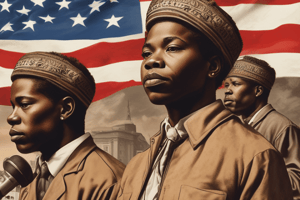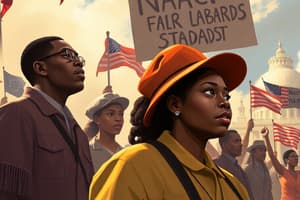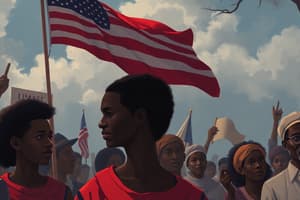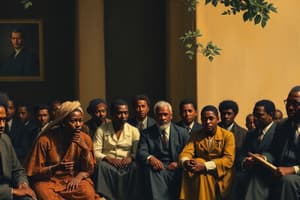Podcast
Questions and Answers
What does NAACP stand for?
What does NAACP stand for?
- National Alliance for African American People
- National Association for the Advancement of Civil Rights
- National Association for Colored People
- National Association for the Advancement of Colored People (correct)
What was the purpose of the Black Panthers?
What was the purpose of the Black Panthers?
A militant political organization fighting for black rights.
What did the Voting Rights Act of 1965 eliminate?
What did the Voting Rights Act of 1965 eliminate?
Devices like literacy tests that restricted voting by black people.
The Twenty-Fourth Amendment allows Congress and states to condition the right to vote on payment of a poll tax.
The Twenty-Fourth Amendment allows Congress and states to condition the right to vote on payment of a poll tax.
What is the significance of the Civil Rights Act of 1964?
What is the significance of the Civil Rights Act of 1964?
What was Freedom Summer?
What was Freedom Summer?
What does 'sit in' refer to?
What does 'sit in' refer to?
What was the March on Washington?
What was the March on Washington?
Who were the Freedom Riders?
Who were the Freedom Riders?
What was Brown v. Board of Education?
What was Brown v. Board of Education?
What was the Montgomery Bus Boycott?
What was the Montgomery Bus Boycott?
What is segregation?
What is segregation?
Flashcards are hidden until you start studying
Study Notes
NAACP
- Founded in 1909, the NAACP (National Association for the Advancement of Colored People) is a civil rights organization promoting equality and combating racial prejudice and discrimination.
- The organization emerged to address issues such as lynching and Jim Crow laws.
Black Panthers
- Established in 1966, the Black Panthers were a militant organization advocating for the rights of Black Americans and challenging systemic oppression.
Voting Rights Act of 1965
- This pivotal law aimed to eliminate obstacles to voting for Black citizens, such as literacy tests that had previously disenfranchised many African Americans during the civil rights movement.
Twenty-Fourth Amendment
- Ratified in 1964, this amendment prohibits both Congress and states from requiring payment of a poll tax as a condition for voting in federal elections.
Civil Rights Act of 1964
- A significant legislative achievement, this act outlawed discrimination based on race, color, religion, sex, or national origin in various areas, including employment and education.
Freedom Summer
- In 1964, Freedom Summer was a voter registration initiative in Mississippi, driven by civil rights groups like the Congress of Racial Equality (CORE) to empower African Americans.
Sit-In
- A form of protest where individuals occupy a space to draw attention to social injustice and demand change, often associated with peaceful civil disobedience during the civil rights movement.
March on Washington
- Held in 1963, this monumental rally aimed at securing civil and economic rights for African Americans is known for Martin Luther King Jr.'s "I Have a Dream" speech and is recognized as a pivotal moment in the civil rights movement.
Freedom Rides
- Beginning in the early 1960s, Freedom Riders, consisting of both Black and white activists, rode buses into the segregated South to challenge and disrupt racial segregation practices in public transportation.
Brown v. Board of Education
- The landmark Supreme Court case in 1954 ruled that state laws establishing separate public schools for Black and white students were unconstitutional, serving as a significant catalyst for desegregation in education.
Montgomery Bus Boycott
- A critical event in the civil rights movement, initiated in 1955, the boycott protested racial segregation in the Montgomery public transit system, significantly impacting civil rights activism and leading to a Supreme Court decision against segregation on buses.
Segregation
- Defined as the action of setting individuals or groups apart based on race or ethnicity, resulting in systemic inequality and discrimination, particularly prevalent in the United States during the 19th and 20th centuries.
Studying That Suits You
Use AI to generate personalized quizzes and flashcards to suit your learning preferences.




